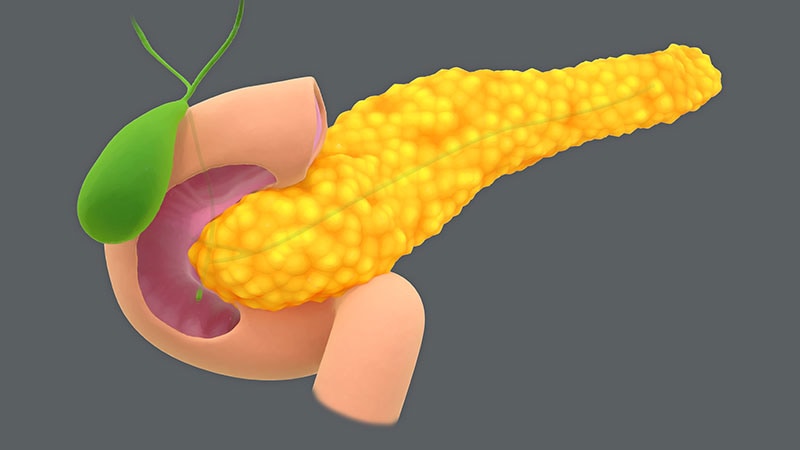“], “filter”: { “nextExceptions”: “img, blockquote, div”, “nextContainsExceptions”: “img, blockquote, a.btn, a.o-button”} }”>
Heading out the door? Read this article on the new Outside+ app available now on iOS devices for members!
>”,”name”:”in-content-cta”,”type”:”link”}}”>Download the app.
The population of older adults is incredibly diverse. Some of us are relatively sedentary and some of us are ultrarunners. Because of this, it can be almost impossible to recommend a single yoga practice that addresses the demands of everyone.
But there is one practice that’s a safe starting point for anyone, whether you’re new to yoga or want to try something different than lowering yourself to a mat. And that’s practicing yoga in a chair for strengthening and stretching.
You can usually find a way to adapt any pose to practicing it as chair yoga for seniors. It also works well in combination with yoga practiced on a mat and in a bed. And anyone can practice chair yoga for seniors, whether you’re younger or older, have an injury or disability, or just feel like it.
Chair Yoga for Seniors Practice
Find a sturdy chair, preferably without arms. If you would like added stability, I recommend placing the chair on a yoga mat or with the back against a wall. Sit in the chair and check that your hips are about level with your knees or slightly higher. You can sit on folded blankets or cushions, or place them under your feet if needed.
Many of these chair yoga for seniors practices can be done standing or lying in bed if that is more comfortable for you. If you’re practicing at home, you can use household items as props. For example, couch cushions work well as bolsters, and a belt or long sock can work as a strap.
Centering
Each time you practice asana (yoga postures), take a few minutes before and after to do some subtle centering practices to draw your attention inward, whether pranayama (breath work), Savasana (relaxation), mindfulness, or meditation. I like to think of these as complements to the physical practice because they allow you to more fully benefit from the time you spend doing yoga.
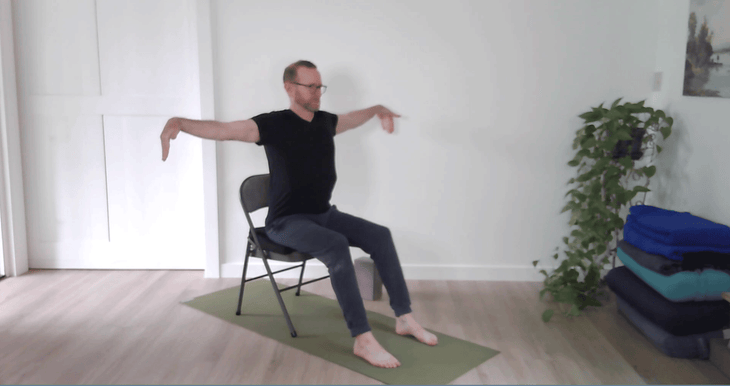
Warrior 2 Arms for Shoulder Strength
To strengthen the arm and shoulder muscles, extend your arms straight out to your sides at shoulder height. Breath comfortably and hold your arms steady. If you like, you can incorporate wrist and hand movements by flexing your wrists and pointing your fingers toward the ceiling as you inhale, and reversing the movement and pointing your fingers down as you exhale. Try to hold your arms out for up to 10 breaths. Lower your arms and rest. If you like, repeat the exercise.
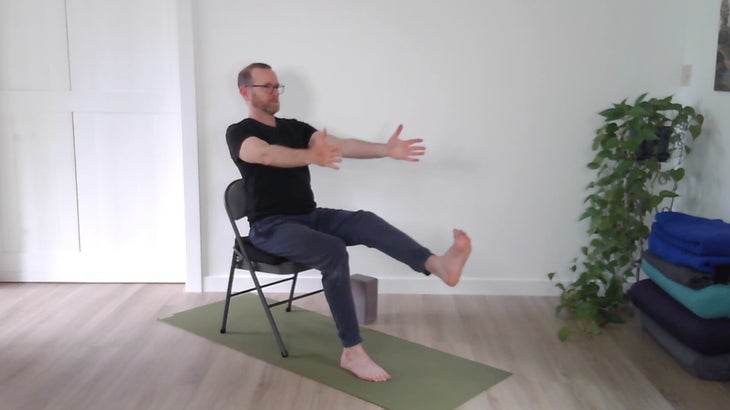
Warrior 1 Arms for Chest Strengthening
To strengthen the chest muscles, hold a block or a book with both hands and extend your arms straight in front of you. Either hold this position steady for up to 10 breaths as you engage your chest muscles or add movement by raising the block toward the ceiling as you inhale and lower it back down as you exhale.
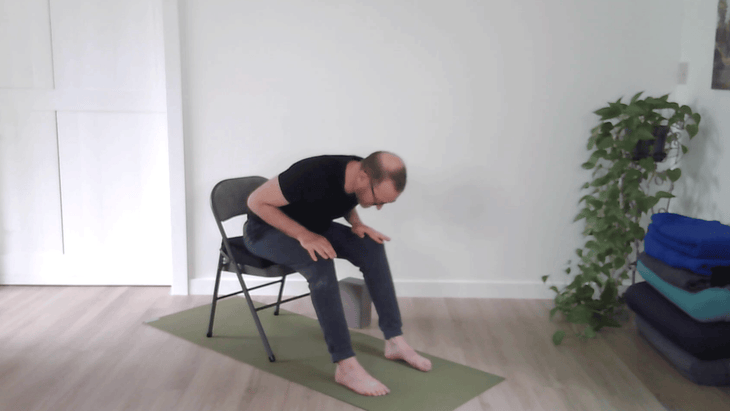
Dynamic Cobra for Spinal Flexibility
During this dynamic practice of Cobra (Bhujangasana), you move with the breath as you increase spinal flexibility. Place your hands on your thighs and exhale as you gently round your back and lower your head.
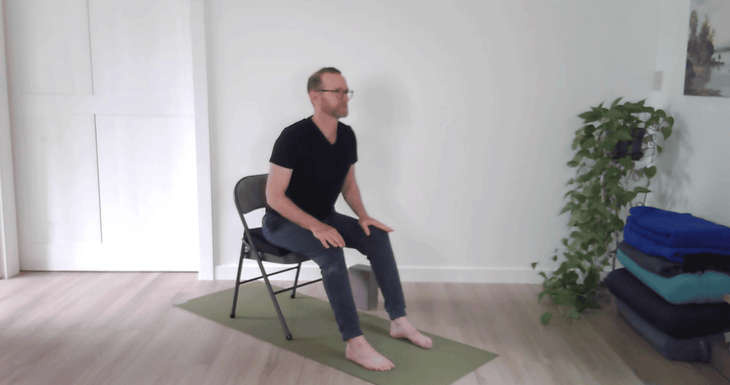
As you inhale, slowly lift your head, neck, and chest into a slight backbend. Repeat the same movements about 5 times, in sync with your breath, to create a wave-like movement along the spine.
Be sure to move slowly and consciously when doing this chair yoga for seniors practice because it includes spinal flexion (forward bending) which can be a concern for people with osteoporosis, a loss of bone mass, and can lead to bone breaks in quick movements and loaded flexion (forward bending with weight). Pay attention to your neck and lower back, and be sure you’re not straining.
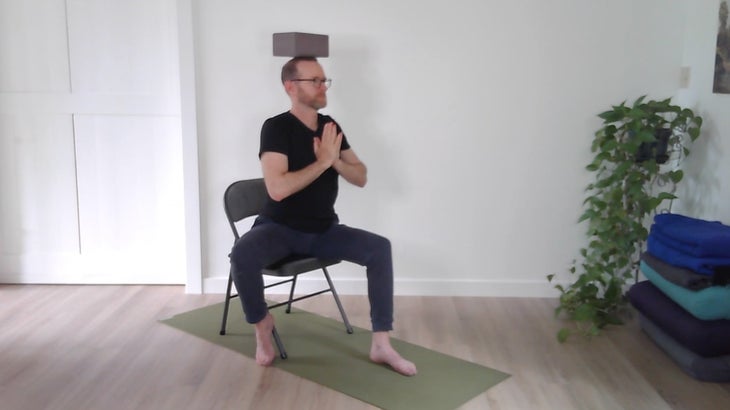
Tree Pose for Balance
This balancing pose can also be done while standing and holding onto the back of a chair for support. From a seated position with your legs in front of you, open your right leg to the side. Place the heel of your right foot against the front leg of your chair, with your toes on the ground, in Tree Pose (Vrksasana).
Sit forward in the chair as you press down through your left foot to engage the muscles of your left leg. Place a lightweight block or book on your head and try to balance it there. Focus your gaze on a single spot several feet in front of you. Bring your palms together at your chest or raise your arms overhead. Try to balance for a few breaths. Then take the object off your head and practice on the other side. Another way to work on balance in this pose is to add movement with a gentle swaying of the arms.
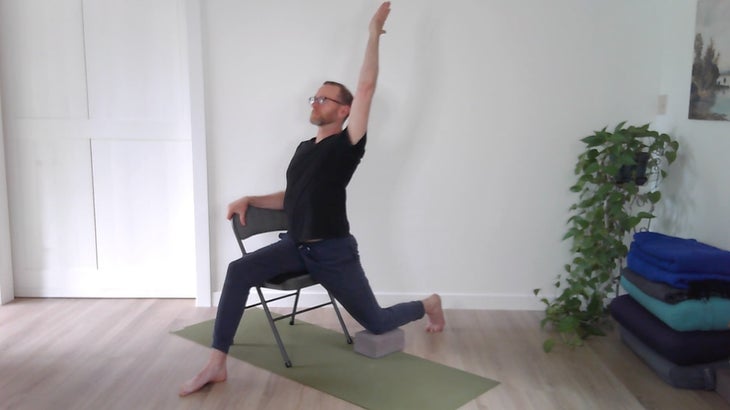
Low Lunge for Hip Extension
The seated version of Low Lunge (Anjaneyasana) is very effective although it can also be done standing with your hands resting on the back of the chair for support. Turn your entire body to face the right in your chair, and hold the back of the chair with your right hand. Scoot toward the front of the chair so that your left hip is off the chair. Check that your right foot is under your right knee, and then extend your left leg straight behind you as far as it will comfortably go. You can place a bolster, large pillow, or block under your left knee for additional support. Focus on the stretch along the front of your left hip, deep in the psoas muscle, which tends to become tight from sitting. Inhale and lift your left arm alongside your head. Stay here for a breath or two and then lower your arm. Turn to face the left side of the chair so you can practice Low Lunge on the other side.
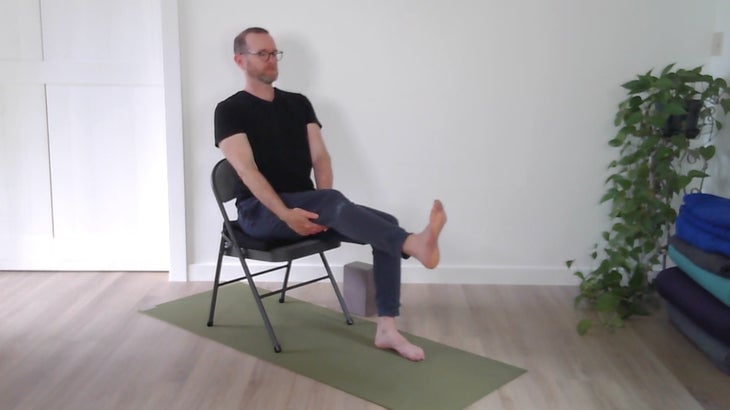
Boat Pose for Core Strength
Sit slightly forward in your chair. Inhale and lengthen your spine, keeping your back long. Take hold of your right thigh, and raise the right leg a few inches off the floor as you lean back slightly. If you want to intensify the pose, try straightening your right leg, reaching your right foot higher. Keep your back long, and try not to engage your lower back. Instead, use your abdominal muscles to help raise your leg.
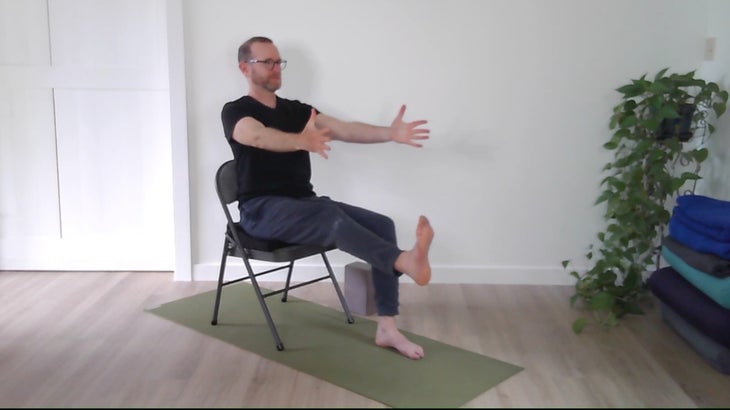
If it’s comfortable for you, release your arms and extend them straight in front of you parallel to your lifted leg. Relax the shoulders and breath in a comfortable way for a few breaths. Then lower your left leg and repeat on the right side.
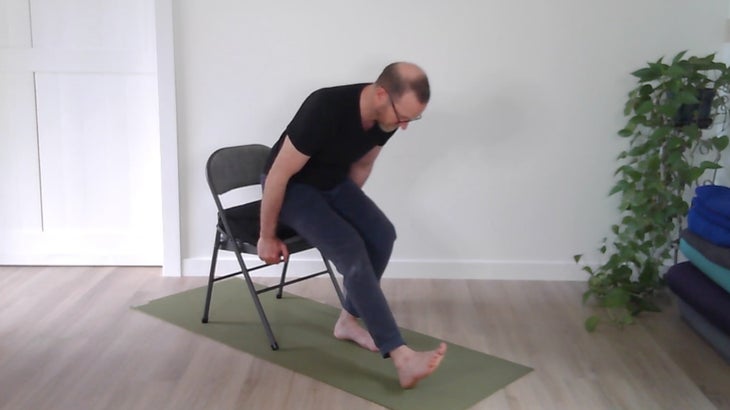
Progressive Chair Pose for Leg Strength
Explore different versions of this seated Chair Pose to see which one helps you strengthen your legs without requiring too much effort. To begin, sit forward in your chair and bring your feet under the knees. Press down into both feet as you lean forward. You can hold onto the chair back or sides of the chair seat for balance. You could also have a second chair in front of you if you want additional support for balance.
If this is comfortable, try lifting your hips off the chair seat an inch or two in a version of Chair Pose (Utkatasana). Stay here for a breath and then lower back down. Repeat this a few times. Or if you like, remain here for a few breaths until you feel tired.
For another variation, try seated chair pose on one leg at a time. Begin by extending your left leg straight in front of you with your left foot hovering an inch or two above the floor. Press your right foot into the floor and lift your hips using just the strength of your right leg. Lower and repeat a few times and then switch sides. Be sure to breathe during these practices.
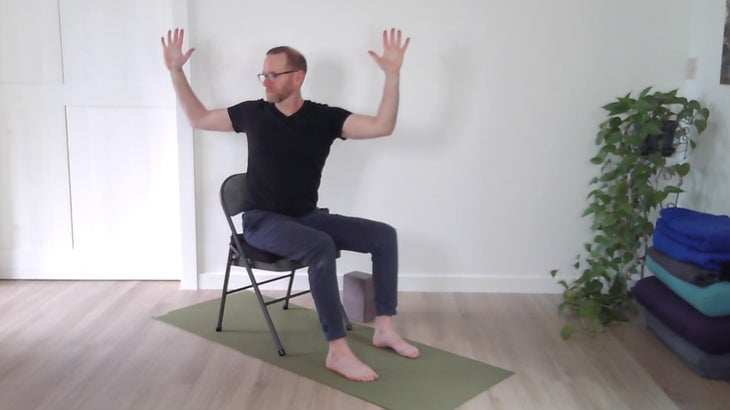
Unassisted Twist for Spine Flexibility
The challenge here is twisting without using the arms to force the spine into a deeper twist. Sit facing forward with a tall spine and your arms in cactus or goal post position, or if it’s more comfortable you can have your hands on your hips. Inhale and lengthen the spine, exhale and twist to your right side in Half Lord of the Fishes (Ardha Matsyendrasana). Inhale and come back to center, and then exhale as you twist to the other side. You can continue to move dynamically with the breath or hold for a few breaths on each side.
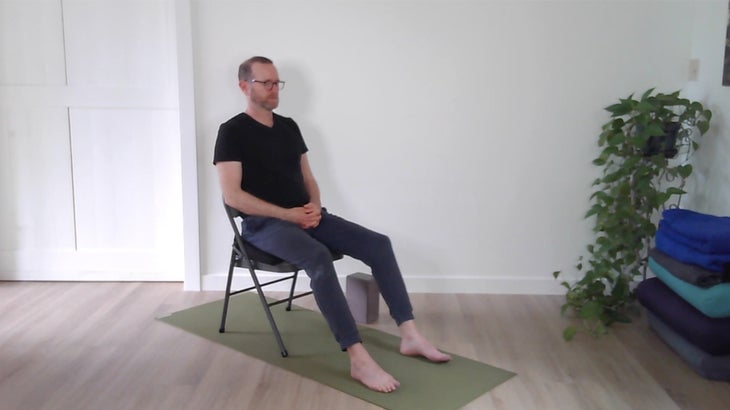
Seated Savasana for Relaxation
End your practice with seated or reclined Savasana. You can scoot all the way back in the chair, lean back, and straighten your legs in front of you. Your legs can be wide apart and you can let the feet fall out to the sides. Or you can rest the feet on a bolster or the seat of a second chair. Take a moment to do a body scan, noticing any sensations in your body. Then notice your breath and your thoughts. Rest here for a moment before sitting back up.
Alternate Nostril Breathing for Nervous System Regulation
Spend a minute after your chair yoga for seniors practice to try nadi shodhana (alternate nostril breathing). Start by closing the right nostril with your right thumb and slowly exhale through your left nostril. Then inhale through your left nostril before you close it with the index finger and open your right nostril. Exhale through your right nostril and continue for a few rounds. Try to breathe slowly and in a relaxed manner. If you feel short of breath, stop and return to normal breathing.
After a few rounds of alternate nostril breathing, you can spend a minute in meditation before coming out of the practice. Notice how you feel later that day or even the next day to see if you found the right balance of effort or if you might have strained. Adjust the practice next time with that awareness, trying to find a balanced approach that supports you physically, mentally, and spiritually.
To learn more about practicing and teaching chair yoga and making yoga accessible for everyone, please join Jivana Heyman and special guests for a live online Accessible Yoga Training Online.






